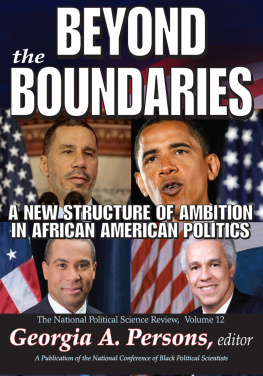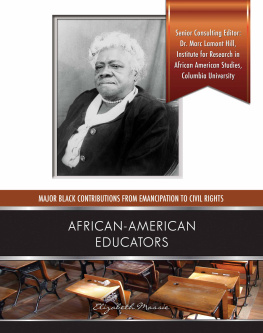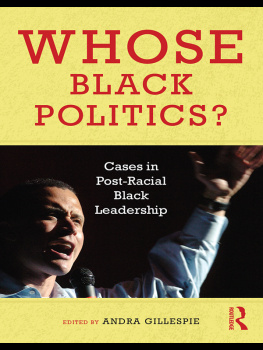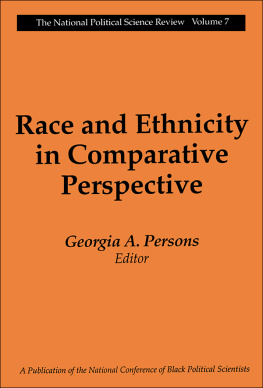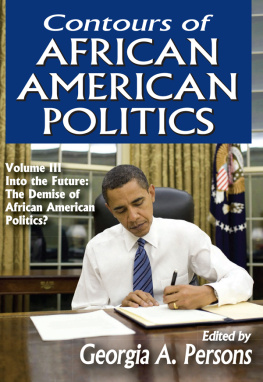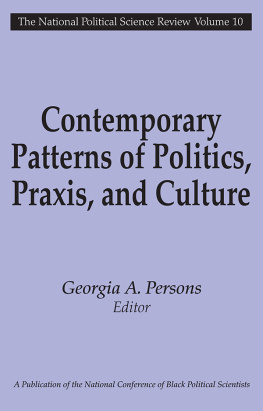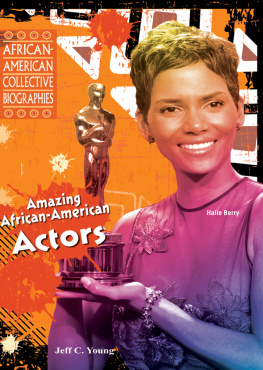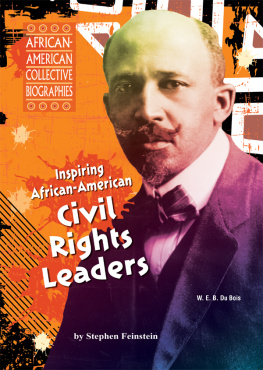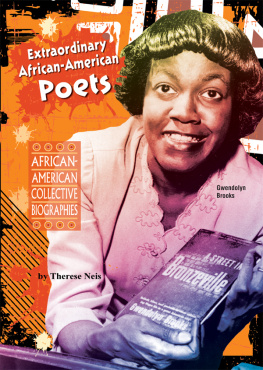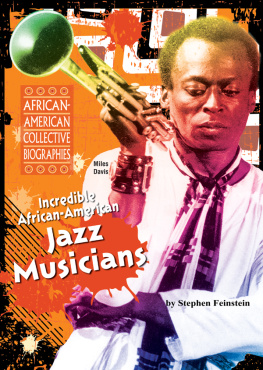BEYOND the BOUNDARIES
THE NATIONAL POLITICAL SCIENCE REVIEW
EDITOR
Georgia A. Persons
Georgia Institute of Technology
ASSOCIATE EDITORS
Robert C. Smith
San Francisco State University
Cheryl M. Miller
University of Maryland-Baltimore County
EDITORIAL BOARD
Nolan Jones
National Governors
Association
Hanes Walton, Jr.
University of Michigan
Charles Hamilton
Columbia University
Lenneal Henderson
University of Baltimore
Mack Jones
Clark Atlanta
University
Melissa Nobles
Massachusetts Institute
Of Technology
Richard Iton
Northwestern University
Cathy J. Cohen
University of Chicago
Susan Carroll
Rutgers University
Susan McManus
University of
South Florida
David Covin
Sacramento State
William Nelson
Ohio State University
Lorenzo Morris
Howard University
Todd Shaw
University of South Carolina
Charles E. Jones
Georgia State
University
Michael Preston
University of Southern
California
Michael Mitchell
Arizona State University
Joseph Stewart, Jr.
University of New Mexico
K. C. Morrison
University of Missouri
Columbia
Marion Orr
Brown University
BEYOND the BOUNDABES
A NEW STRUCTURE OF AMBITION
IN AFRICAN AMERICAN POLITICS
The National Political Science Review, Volume 12
Georgia A. Persons, editor
A Publication of the National Conference of Black Political Scientists
First published 2009 by Transaction Publishers
Published 2017 by Routledge
2 Park Square, Milton Park, Abingdon, Oxon OX14 4RN
711 Third Avenue, New York, NY 10017, USA
Routledge is an imprint of the Taylor & Francis Group, an informa business
Copyright 2009 by Taylor & Francis.
All rights reserved. No part of this book may be reprinted or reproduced or utilised in any form or by any electronic, mechanical, or other means, now known or hereafter invented, including photocopying and recording, or in any information storage or retrieval system, without permission in writing from the publishers.
Notice:
Product or corporate names may be trademarks or registered trademarks, and are used only for identification and explanation without intent to infringe.
Library of Congress Catalog Number: 2008051231
Library of Congress Cataloging-in-Publication Data
Beyond the boundaries : a new structure of ambition in African American politics / Georgia A. Persons, editor.
p. cm. -- (National political science review ; v. 12)
Papers from a symposium.
Includes bibliographical references and index.
ISBN 978-1-4128-1048-7 (alk. paper)
1. African Americans-Politics and government--21st centuryCongresses. 2. Ambition-Political aspects--United States--Congresses. 3. African American politicians--Congresses. 4. Political candidates--United States--Congresses. 5. Political campaigns--United States-Congresses. 6. Elections-United States-Congresses. 7. United States-Politics and govern-ment--2001---Congresses. 8. United States-Race relations-Political aspects-Congresses. I. Persons, Georgia Anne.
E185.615.B49 2009
323.1196073--dc22
2008051231
ISBN 13: 978-1-4128-1048-7 (pbk)
Contents
Georgia A. Persons
Robert C. Smith, Symposium Editor
Angela K. Lewis
Tyson D. King-Meadows
Wendy G. Smooth
Richard T. Middleton, IV and Sekou M. Franklin
Byron DAndra Orey
Walter W. Hill
Richard Forgette and Marvin King
Hanes Walton, Jr. and Robert C. Starts
Andra Gillespie
Jas M. Sullivan
Melissa Comber
Hanes Walton, Jr., Josephine A.V. Allen, Sherman C. Puckett, Donald R. Deskins, Jr., and Leslie Burl McLemore
Carter A. Wilson
Michael Mitchell, Minion K.C. Morrison, and Ollie Johnson, III
Sherri L. Wallace and Dewey M. Clayton
Hanes Walton, Jr.
The Editor extends special thanks to all of the contributors whose work is included in this volume of the National Political Science Review. Deepest gratitude to Associate Editor Robert C. Smith for organizing and managing the anchoring symposium for this volume, and to colleagues in the discipline who served as reviewers and made completion of this volume possible.
Thanks to Stephen Henderson, Ivan Allen College of Georgia Tech, whose small but frequent favors and consideration provided support and encouragement in ways that engender deepest appreciation.
The Editor extends deep gratitude to all of the members of the Editorial Board, and a special welcome to new members who have agreed to lend their assistance in furthering the goals of this journal.
It has long been a well established truism that African American politics was a politics of low resources defined by an insurgent, black liberationist ideological thrust, bounded by the opportunities and restrictions of a relatively small and spatially concentrated primary support base of black voters, and limited by the persistent resistance of many white voters to support black candidates. The results have been the presumption and reality of black electoral gains being disproportionately restricted to areas of sizeable black population bases, and the subsequent inability of black candidates to be successful in statewide electoral contests in all but a handful of cases. Presumably, the aspirations of black candidates for national office were just a dream.
Analysts of African American politics had arrived at a conventional wisdom that conceded a virtual cap on both the possible number of black elected officials and the level of elective office to which they could ascend. Yet in the fall of 2008 as this volume went to press, we found ourselves poised between the astonishing breakout, statewide campaigns of some half dozen black candidates in 2006, and the even more astonishing emergence of Barack Obama as the Democratic nominee for United States president.
The anchoring symposium of this volume of the National Political Science Review was planned before the emergence of Obama as a strong contender for the Democratic Partys nomination. Rather, the early focus then was to attempt to capture the dynamics of a newly emergent episode of ongoing social change; a new spate of statewide campaigns for high-level offices in the evolution of that which we call black politics. When we focus just on the 2006 statewide races, we see what appears to be, in the words of Symposium Editor, Robert Smith, a new structure of ambition in African American politics. We see the ways in which individual ambition operates at the core of a set of strategic variables that hold the promises of expanding the boundaries of African American electoral politics. Or do we? Are we really seeing merely a new structure of ambition, or did the 2006 races presage an emergent dynamic of complexity that requires a more nuanced framing and analysis?
As the reader looks beyond the anchoring symposium and across the totality of this volume, she will notice something of a mix of ways the contributors use to frame the evolving state of black political activity against the broader context of social change that black politics helps both to illuminate and to define significantly. We see the use of the notion of a new structure of ambition in African American politics as essentially an overlay upon the more conventional, though still relatively new, frame of a deracialized black politicsthe latter framing having always harbored the seeds of its own internal contradictions. The analyses also show that successful black politics remains hugely disproportionately Democratic Party politics and that black Republican candidates cannot easily obtain successful political lift, nor electoral victory. Indeed, the analyses clearly reveal the persistence of a strongly issue-based black politics that is nestled within the larger context of Democratic Party philosophy and issue positions. Perhaps not surprisingly, contributors reveal that despite the widespread adoption of deracialized campaigns, black candidates remain uniquely vulnerable to the use of racial stereotypes and racist symbolism by their white opponents.


